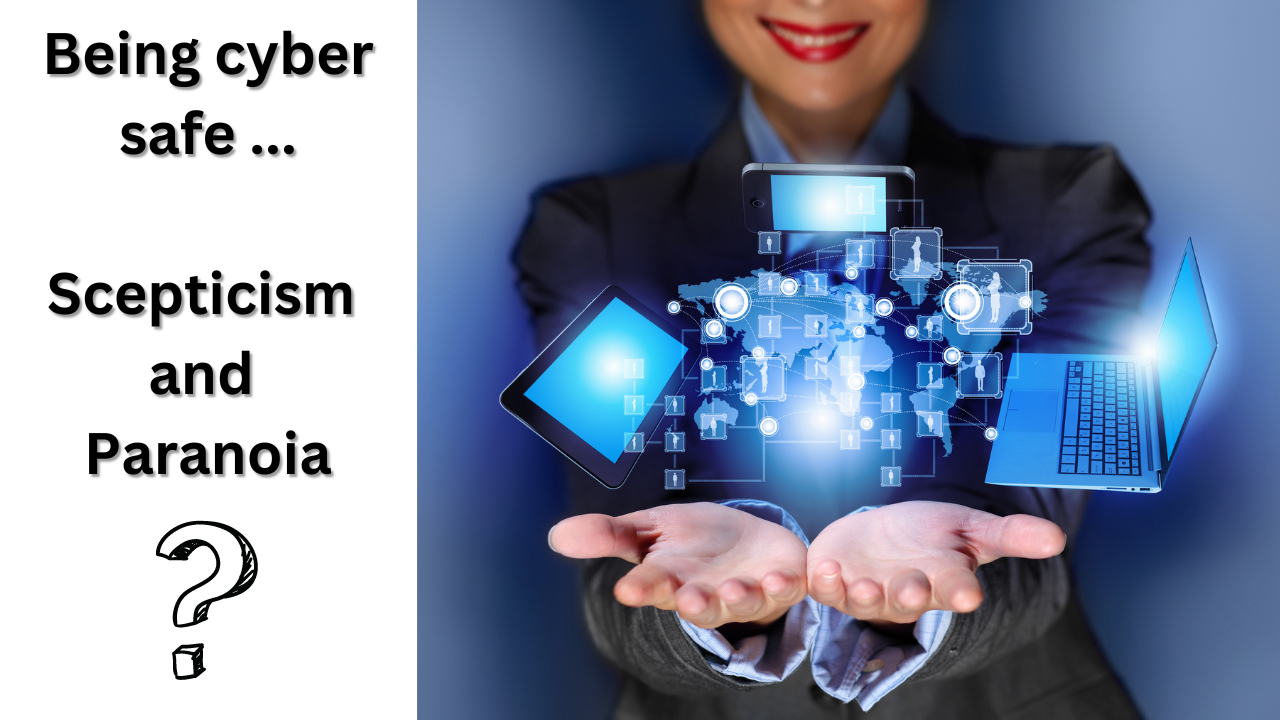
Do you need to be paranoid or sceptical to be cyber-safe online?
Do you need to be paranoid or sceptical to be cyber-safe online?
I have experienced and encountered many discussions that cybersecurity professionals are paranoid about everything. I beg to differ. And I would like to put a stake in the ground that we are more sceptical than paranoid. In my humble opinion, we need to find harmony between a sceptical and paranoid mindset.
As we reflect on our lives, our minds are constantly in flux, processing, evaluating, and interpreting the world around us. Scepticism and paranoia are two notable, distinct mental states that influence our perceptions and decisions. Understanding these cognitive processes is crucial not only in recognising their differences but also in leveraging them effectively.
While I am not a psychologist, I do, however, understand both sufficiently to know and apply the differences. I hope this will clear up some misconceptions about cyber security = paranoid.
Scepticism: A Healthy Dose of Doubt
Scepticism originates from the Greek word "skeptikos," meaning "to consider or examine." It is a critical thinking skill characterised by a tendency to question or doubt accepted opinions and facts. Sceptics tend to demand evidence before accepting any claim, making them less susceptible to manipulation and deception.
The conditions that foster scepticism often stem from an educational or intellectual background emphasising critical thinking and evidence-based reasoning. Exposure to diverse viewpoints, robust debate, and a culture of questioning can all nurture a sceptical mind.
Using scepticism effectively involves applying it as a tool for inquiry and learning. It can prevent us from accepting misinformation and stimulate us to investigate further. For example, in the case of cyber security, you only start to apply a sceptical lens on activities when you have evidence based on tell-tale signs of attempted cyber attacks on you. However, it's essential to avoid cynicism, an excessive form of scepticism that can lead to a distrustful and pessimistic view of the world.
Paranoia: A Suspicion Run Amok
On the other hand, paranoia is a state of persistent and pervasive suspiciousness or mistrust of others, often reaching irrational levels. Unlike scepticism, which is grounded in evidence-based reasoning, paranoia is typically fueled by fear, anxiety, or past traumatic experiences.
Environmental factors such as high-stress situations, isolation, or experiences of betrayal can potentiate paranoid thinking. It's also associated with certain mental health disorders like schizophrenia, paranoia disorder, and personality disorders.
While paranoia is often seen as detrimental due to its association with irrational fears, it isn't entirely without utility. It can serve as a defence mechanism in moderate amounts, heightening our alertness to potential dangers. However, when paranoia becomes pervasive and impairs daily functioning, it becomes necessary to seek professional help.
Striking a harmony between the two
In summary, while scepticism and paranoia can appear similar in their questioning of reality, they differ fundamentally in their origins and outcomes. Scepticism, grounded in reason and evidence, serves as a powerful tool for critical thinking. Paranoia, often rooted in fear and mistrust, can serve as a survival mechanism but can also lead to significant distress when unchecked.
To use these states of mind effectively, we must harmonise to use each of them effectively. Encourage a sceptical approach towards new information, emphasising evidence and rationality. Paranoia, when detected, should be managed carefully, recognising it as an indicator of heightened alertness but also acknowledging its potential to escalate into harmful patterns of thought.
In our quest for understanding, we must embrace the questioning nature of scepticism and remain vigilant about the potential risks of paranoia. In doing so, we can navigate the complexities of the world with a clear and discerning mind.
#alvinsrᴏdrigᴜes ✦ #alvinsratwork ✦ #LBFAlumni ✦ #SkyHighTower ✦ #ExecutiveDirector ✦ #cybersecurity ✦ #cyberhygiene ✦ #BusinessTechnologist
Chief Sales Orchestrator ✪ Award-Winner ✪ Speaker ✪ Panelist ✪ Sales Trainer and Coach to Entrepreneurs, Sales Teams : Sales Skills, LinkedIn Sales, Leadership, Career ✪ Sales Success Orchestrator Methodology
11moStay safe
Senior Vice-President - Governance, Risk, Compliance & Internal Controls | Internal, IT, Forensic & Sustainability Audit | SOX | Consulting | Facilitate Audit Committee | CA, CIA, CCSA, CRMA, CFE, CISA, CRISC |
11moA good share. As auditors, we cannot be paranoid about our auditees being crooks as well. Thanks.
Making a Difference in Families from Generation to Generation ✪Weaving ✪ Wealth ✪ Wisdom ✪ Winning ✪ Willing ✪ Well-Being ✪ Walking ✪ Writing ✪ Whole ✪ Family Wealth ✪ Family Leadership ✪ Family Office ✪
11moLearning to Be mindful, with you Alvin Rodrigues